As consumer demands for beauty products and skincare regime tools continue to be a trend, pressure falls to skincare and cosmetic companies to keep up.
Over the last decade, according to Enterprise Ireland, a significant number of new brands have come onto the market and that Irish beauty and cosmetic brands are increasingly becoming recognised for the quality products and authenticity.
This is particularly the case with company founders who seek to make a difference through the products they develop.
“Irish beauty and cosmetic companies demonstrate an exceptional commitment to making a positive impact on the environment,” Enterprise Ireland says.
“This focus on sustainability is seeing a rise in high quality, natural and sustainable products as well as driving positive business practices creating collaboration and solutions that are leading to real change in the industry.”
RTÉ Business sat down with three family skincare and cosmetic brands to find out how Irish companies compete internationally and also meet the demands of Irish consumers.
Ireland’s first family apothecary, the Gardiner Family Apothecary based in Dundalk, Co Louth has been in business for 90 years and was there when the Irish cosmetic industry began.
Grandfather of the current CEO Joanna Gardiner, Joseph Gardiner, laid the foundations to develop the business, starting out as a commercial traveller during the early years of the Irish Free State.
He saw chemists mixing a cream base with steroids to create ointments to treat issues like eczema, using formulations developed in England.
Mr Gardiner decided to make the creams himself, such as Silcock’s Base which is still sold today by the company branded under Ovelle, and delivered and sold them back to pharmacists directly.
He passed the business on to his sons, Seán and Gerard Gardiner in the 1970s. Seán studied pharmacy and put a new pharmaceutical blueprint on the business.
During this time, the company struck up relationships with UNICEF, MSF and the UNRWA, supplying products like calamines and antiseptics, and this has been maintained since.
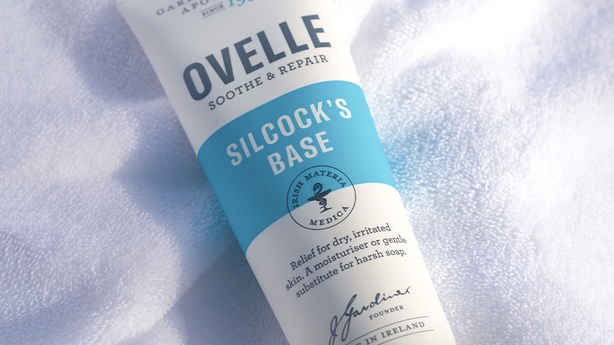
Joanna Gardiner joined the company in 2000 as a sales representative and today works alongside her brother Patrick who is a pharmacist. In recent years, she has developed a second brand in the company, Elave, which she said focuses on preventative and protective skincare.
“My grandfather was ahead of his time, but the ingredients used in the 1930s were the only ones available. Where we can, we have changed ingredients and upgraded the formulations,” Ms Gardiner said.
She added that in the modern world, people are more exposed to skin irritation with daily washing and more exposure to the sun.
“I get a bit angry at the amount of unnecessary chemicals some brands use. I’ve created Elave in the knowledge that people really do suffer in silence with conditions like eczema, dermatitis and sensitive skin,” she said.
“The drier your skin is, the more likely it may have a crack, and this can be easily irritated. People don’t tend to think of the skin as the largest organ in the body.
“People underestimate it, but skin effects confidence and self-esteem and it makes a big difference if you can improve things for people”.
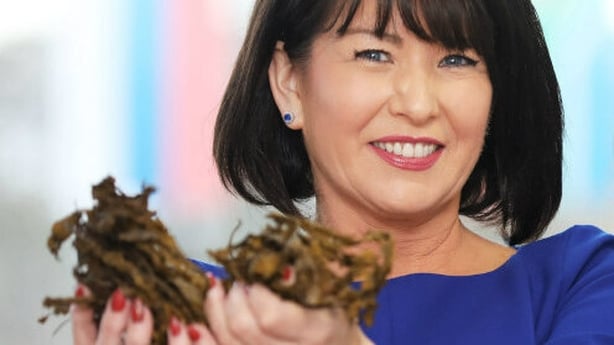
It was through a background in nursing that CEO of Rí na Mara, Deirdre Uí Chathmhaoil, first discovered how natural applications had healing properties.
She worked as a nurse in a dermatology unit in the UK and later studied cosmetic science to find out about formulations and ingredient mixing.
Returning to An Spidéal, Co Galway, in the early 2000s, she heard about people taking seaweed baths for skin benefits due to the vitamins, proteins and minerals occurring naturally in seaweed.
“People knew way back when that there were such benefits to be could gained from the natural organic seaweed,” she claimed.
“I wanted a natural product with no artificial ingredients but at the time, there wasn’t a huge strive to be organic or sustainable, but I felt like this was the future”.
She explained that using traditional methods, local seaweed harvesters cut the upper section of seaweed species and leave the lower intact to regenerate quickly. The cut seaweed undergoes a minimal extraction process to ensure vitamins and proteins are maintained, and it is mixed with other ingredients to create the products, including marine algae.
“We spent three years developing the product, travelling across Europe, meeting marine algae experts and professional cosmetic formulators,” she said.
“We discovered that the precise species of seaweed that we had been researching flourished off the west coast of Ireland”.
She said that the industry had a different landscape then – there were not as many family skincare businesses and competing internationally was a challenge.
What do consumers expect from skincare brands in 2024?
As cost of living pressures continue, affordability has proven important for consumers, as well as transparency in ingredients, the CEOs said.
With businesses more accessible now online and on social media, consumers tend to have questions about the products, and they expect accountability. They also want to see brands give back to their community, whether environmentally, through charity work or socially.
Ms Uí Chathmhaoil said that Irish consumers were very aware and savvy when it came to sustainability, but also wanted to see proven effectiveness in what they buy.
“Our products are chemical free, have no fragrances, colour, alcohol or parabens and in a time when consumers want transparency, I can show them the entire process of getting the product to them using harvesters I know personally,” she said.
“We are trying to have as little impact on the environment as possible. We are looking at biodegradable packaging for our products using seaweed, and work with organisations and companies to preserve the seabed, marine life and coastline.
“Consumers will check the ingredient listing and will send questions about the benefits of each ingredient, which is fantastic that they are so aware of what they are using on their skin”.
Ms Gardiner said using your business as a force for good was important.
“There’s a huge focus on wellness, health and diet. What previous generations might have put up with, this generation won’t,” she explained.
“All our products are cruelty free, and 97% vegan across the board. Our ingredients have a naturally short supply chain, but sustainability is non-negotiable and it’s everything we strive to be”.
The company installed 220 solar panels in 2019, and have expanded on the previous generation charity work, to cover national and all-island health care charities for adults as well as children.
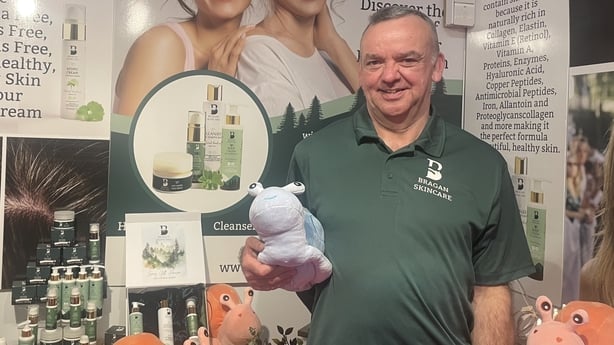
Having launched his company Bragan Skincare in July 2022, Kieran Corley has about one million snails on his farm in Monaghan.
With a background in business, he decided to get involved in snail farming in 2019, originally with the idea to sell his snails for escargot markets.
A farmer’s son, he always enjoyed animal husbandry, but through working with snails, he discovered something quite unexpected, he said.
“When I started tending to the snails, I noticed my skin becoming softer. I had scars on my arms, and after a few weeks they were gone.
“This sparked my interest, and I discovered that snail mucin (the slime that is secreted when a snail moves) was widely used in the cosmetic industry having naturally beneficial ingredients like collagen, hyaluronic acid and copper peptides”.
He then mixed the mucin with aloe vera at the kitchen table, and tested it on family and friends, which saw one case of psoriasis clear up in a matter of weeks.
“I got a thrill out of that and knew we were onto something with healing capability”.
The search began to find a pharmaceutical company to make the product commercially, which led to Mr Corely looking overseas and teaming up with a company in Italy.
He explained that his end of the work is labour intensive, caring for the snails and extracting the mucin through harvesting three times a year, with an average mature snail producing just one gramme of mucin a year.
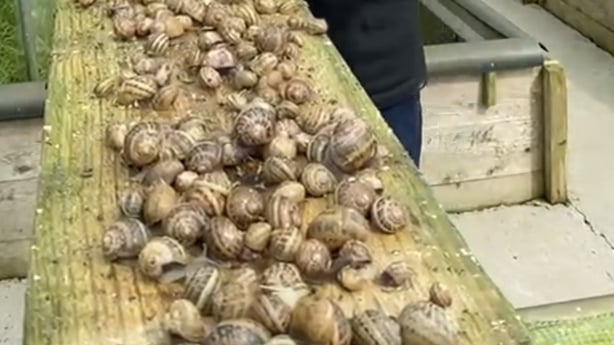
A snail naturally secretes slime or mucin through movement, to stick onto surfaces and to heal themselves.
To extract the mucin, Mr Corley takes 20,000 snails and places them onto a large stainless steel moving grid made out of steel and mesh.
During this process, the snails begin to try stick onto the mesh as it moves, in a motion that sees the snails rocked back and forward.
With that, the mucin falls down into a container below, which Mr Corley then collects after he has returned the snails to the farm.
“No one in the UK or Ireland has gone down this route, so I’m paddling my own canoe, but people are hearing about us through word of mouth and I’m starting to get approached by pharmacies about stocking the products,” he explained.
“There is a trend to move back to nature and my product is from a natural source, that seems to be hitting the right note”.
He said the development of his products have been consumer-led, and he is trying to service the needs of people who have found that nothing else out there has worked for them yet.
Future expansion
Enterprise Ireland said that the Irish beauty and cosmetic industry continues to have strong sales internationally.
For the Gardiner Family Apothecary, 57% of sales last year were exports.
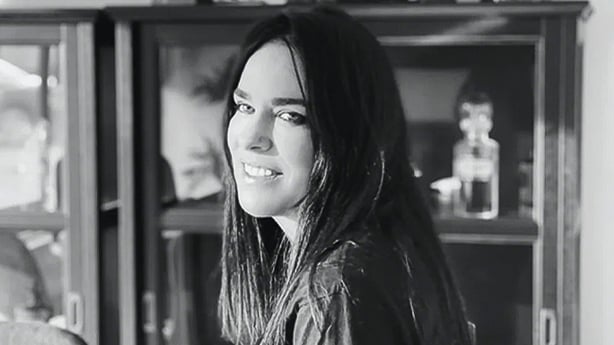
Ms Gardiner said that being involved with Enterprise Ireland and attending trade shows helped bring the business to an international stage, identifying fast growing markets outside of Europe.
“Ecommerce is a global market and you have to adapt and service it. The key to internationalising is finding good distributors,” she said.
“Being an Irish business, you have to act bigger than you are and invest heavily in the brand and formulation. You spend a lot of time adapting to trends that a smaller more agile company can achieve faster. People tend to trust a smaller brand and that benefits us compared to bigger pharmaceutical companies.
“It’s about stripping back skincare. That’s how we compete, with safe sensitive skincare that relieves peoples’ conditions”.
The companies said that a key part of this is proving your brand can be trusted.
Ms Uí Chathmhaoil said that investing in digital marketing was part of this.
“Marketing has been a challenge for the entire journey, as we will never have the same advertising budget as bigger companies,” she explained.
“There have been similar small businesses who have opened up and had to close as the challenge became too much but we have learned how to face those challenges head on and try work around them by adapting.
“You have to be willing to change to meet the needs of the fast moving beauty trends”.
